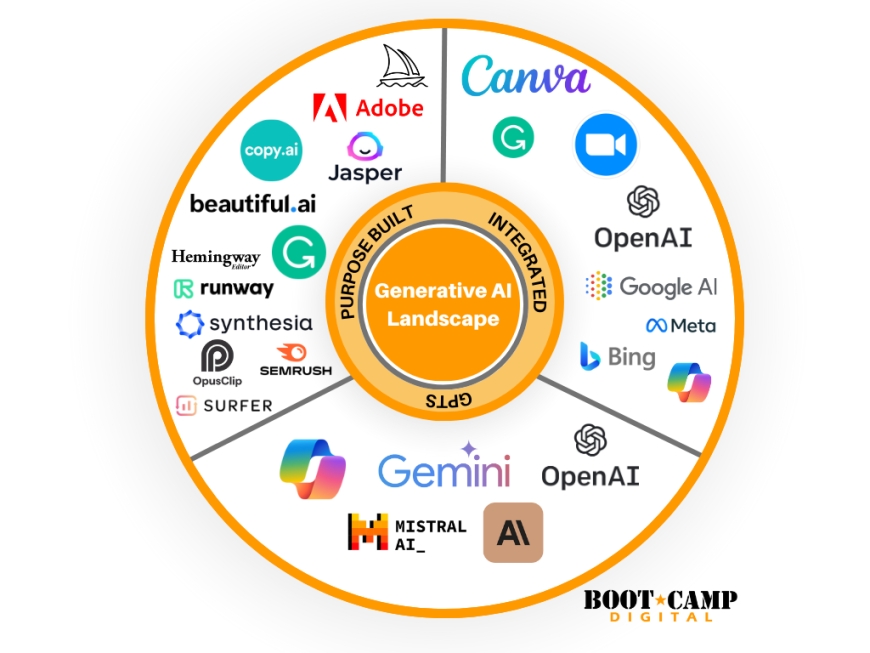How Businesses Leverage Generative AI Tools for Growth

The rise of artificial intelligence (AI) has transformed how businesses operate and innovate. One area of AI gaining significant attention is generative AI, which has proven to be a game-changer in driving growth and efficiency. Generative AI tools, like OpenAI's GPT models and similar systems, enable businesses to automate tasks, generate content, enhance customer experiences, and even fuel new products and services. In this blog, we’ll explore how businesses across different industries are harnessing generative AI tools to fuel growth and stay competitive.
What is Generative AI?
Generative AI refers to algorithms and models that can create new content, such as text, images, music, and code, by learning from existing data. Unlike traditional AI, which typically analyzes data to provide predictions or classify information, generative AI is capable of producing new and original outputs. This makes it a versatile tool for businesses looking to innovate, enhance their operations, and engage customers in new ways.
Enhancing Customer Service
One of the most significant ways businesses are using generative AI is in customer service. AI-powered chatbots and virtual assistants, like ChatGPT, can provide real-time assistance to customers, answering queries, processing orders, or resolving issues. These tools leverage natural language processing (NLP) to understand and respond to customer requests, creating a seamless and personalized experience.
For businesses, this means reduced response times, 24/7 availability, and cost savings by automating repetitive customer service tasks. Moreover, these tools can continuously improve by learning from each customer interaction, further enhancing their ability to handle complex queries.
Case Study: AI-Powered Customer Support
Companies like Sephora and H&M use AI-driven chatbots to assist customers in finding products, checking inventory, and tracking shipments. These AI assistants provide personalized product recommendations based on customer preferences, helping businesses drive sales and improve customer satisfaction.
Content Creation and Marketing
Generative AI is also revolutionizing content creation and marketing strategies. Businesses are now leveraging AI tools to generate high-quality content quickly and at scale. From blog posts and social media updates to product descriptions and marketing copy, generative AI can create compelling written content with minimal input from humans.
By using AI, marketing teams can streamline content production, maintain consistency across channels, and tailor content to different customer segments. Furthermore, AI can analyze customer behavior and preferences, providing insights that help businesses create more targeted and effective marketing campaigns.
Case Study: AI-Generated Social Media Posts
Many businesses in the fashion and tech industries are using generative AI tools to automate their social media strategies. AI can craft posts, schedule them, and even respond to comments, reducing the time and effort required to maintain a social media presence. This allows businesses to focus more on creative strategy and less on the logistics of posting content.
Product and Service Innovation
Generative AI tools are not just limited to automating tasks; they can also drive product and service innovation. AI can analyze vast amounts of data to identify trends, gaps in the market, or new opportunities for growth. By combining this information with generative capabilities, businesses can design new products, optimize existing ones, or create entirely new services.
For instance, AI-driven design tools can generate product prototypes based on customer feedback or market data, helping businesses to quickly iterate and bring new offerings to market faster.
Case Study: AI in Product Design
In the automotive industry, companies like BMW and Tesla use AI for product design and optimization. AI systems help engineers and designers create more efficient car models by simulating different design options and testing their performance. This allows for rapid innovation and reduced development costs, ultimately benefiting the company’s bottom line.
Personalizing Customer Experiences
Generative AI enables businesses to deliver hyper-personalized customer experiences by creating tailored recommendations, offers, and content. By analyzing customer data, such as browsing history, purchase behavior, and preferences, AI can generate personalized product recommendations, advertisements, and even customized user interfaces.
This level of personalization helps businesses improve customer loyalty, drive repeat purchases, and increase overall satisfaction. Personalization has become a key differentiator for businesses looking to build stronger relationships with their customers and stand out in a competitive marketplace.
Case Study: Personalized Shopping Experiences
Amazon is a prime example of using generative AI to personalize customer experiences. Their recommendation engine uses AI to suggest products based on a customer’s past behavior and preferences. This not only increases the likelihood of a purchase but also enhances the overall shopping experience by making it feel more tailored to the individual.
Automating Administrative Tasks
Beyond customer-facing applications, generative AI can streamline administrative processes within businesses. Tasks like drafting emails, creating reports, scheduling meetings, and even generating financial forecasts can be automated with the help of AI. This reduces the workload on employees and frees them up to focus on more strategic tasks that require human creativity and problem-solving.
Generative AI tools are particularly useful in industries like finance, where they can generate financial reports and predict market trends. Similarly, in HR, AI can assist in drafting job descriptions and analyzing candidate applications, saving valuable time for HR professionals.
Case Study: Automating Report Generation
In the financial services sector, companies like JPMorgan Chase use AI tools to automate the generation of financial reports. By doing so, they not only reduce the time spent on routine tasks but also ensure accuracy and consistency in their reports, enabling faster decision-making.
Enhancing Data-Driven Decision Making
Generative AI can assist businesses in making data-driven decisions by generating insights from large datasets. With AI, companies can analyze customer feedback, market trends, competitor activity, and other data sources to uncover valuable insights. This can help businesses make more informed decisions about product development, marketing strategies, and overall business growth.
AI-generated reports can offer real-time, actionable insights, which can be used to optimize business operations and drive better outcomes. By leveraging AI’s ability to process vast amounts of data, businesses can stay ahead of trends, minimize risks, and seize opportunities quickly.
Case Study: AI in Data Analysis
Companies like Netflix and Spotify rely heavily on AI to analyze user data and generate personalized recommendations. These recommendations drive user engagement and customer retention, two essential metrics for their continued growth.
FAQs
1. What is generative AI?
Generative AI refers to artificial intelligence systems capable of creating new content, such as text, images, or code, by learning from existing data. Unlike traditional AI that focuses on prediction or classification, generative AI produces original outputs.
2. How can generative AI improve customer service?
Generative AI can enhance customer service by automating responses to common customer queries, providing personalized recommendations, and offering 24/7 support. This reduces wait times, improves efficiency, and enhances customer satisfaction.
3. How can businesses use generative AI for content creation?
Businesses can use generative AI to quickly produce high-quality content for blogs, social media, marketing materials, and more. AI tools can automate writing, optimize content for specific audiences, and maintain a consistent brand voice.
4. What industries benefit most from generative AI tools?
Generative AI tools benefit a wide range of industries, including e-commerce, healthcare, automotive, finance, and entertainment. These tools can improve customer experience, streamline operations, enhance marketing efforts, and drive innovation in product development.
5. Can generative AI replace human workers?
While generative AI can automate many tasks and improve efficiency, it is unlikely to fully replace human workers. Instead, AI complements human creativity and problem-solving abilities, allowing employees to focus on more strategic and complex tasks.
Conclusion
Generative AI tools have proven to be a powerful asset for businesses aiming to drive growth, efficiency, and innovation. From enhancing customer service and content creation to fueling product development and personalizing user experiences, AI is transforming how businesses operate and engage with customers. As these tools continue to evolve, the potential for businesses to leverage them for further growth is vast. However, it’s important for businesses to approach AI adoption thoughtfully, ensuring that they complement human expertise and foster innovation. As AI technology advances, those who embrace it will be well-positioned to thrive in a rapidly changing business landscape
What's Your Reaction?





























